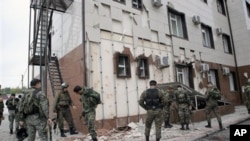Southern Russia's long simmering Islamic rebellion flared up when Chechen gunmen attacked the republic's parliament, killing three security officers and wounding at least 17 other people before three of the attackers died in a counterattack.
Hours before Russia's top policeman, Interior Minister Rashid Nurgaliev, was to visit Chechnya's parliament, a carload of Chechen gunmen tailgated a parliamentarian's car into the tightly guarded government compound. Shouting "Allahu Akbar!" - or "God is great!" - they ran through the building, shooting policemen, seeking hostages, and setting off bombs.
|
Doug Bernard talks with VOA Moscow correspondent James Brooke
|
After a half hour gun battle, three people inside the Parliament had been killed and three militants were dead. All day, Russian television showed images from the scene: a severed leg, windows blown out of the parliament building, and distraught women in head scarves climbing into an armored personnel carrier. The interior minister, who may have been a target, said that the attack was an exception.
Despite reassuring words from the uniformed police general, the other video images from Grozny were graphic reminders to Russians that there is a slow burning civil war in the nation's southernmost, majority Muslim republics.
In Ingushetia, the republic immediately to the west of Chechnya, attacks have killed over 400 policemen and over 3,000 civilians in the last five years.
In Dagestan, the republic immediately to the east of Chechnya, Interior Minister Nurgaliev said Monday that there have been 174 attacks on policemen this year, killing 89 and wounding 264.
To many, Chechnya seemed to be suffering from war fatigue, after two bloody wars with Russian troops in the 1990s. Ramzan Kadyrov, the republic's 34-year-old president, has kept violence at bay with a mix of repression, nationalism, Islam and money from Moscow.
Alexey Malashenko, a Moscow-based analyst for Carnegie Center, said that Tuesday's attack followed an assassination attempt on the Chechen leader in May and a bloody attack on his native village in August.
"It's not linked to Islam. It's directed against Ramzan Kadyrov personally. To show to everybody that the opposition, national opposition, is able to do anything they want, even in the heart of Grozny, the capital of Chechnya. So they are strong. And from that point of view, the politics of stabilization of Ramzan Kadyrov failed," said Malashenko.
One week ago, Chechen's leader addressed hundreds of delegates to a world Chechen Congress in Grozny, saying that he had restored peace to the republic. Appealing for unity, he said: "Today, we are masters in our own republic. We have full freedom, and all opportunities for observing the canons of Islam. We can freely shout to the entire world that we are Muslims and Chechens. What more do we want?"
To defuse separatism, Chechen President Ramzan Kadyrov has created a republic with virtually all the trappings of an independent state. While he calls himself "Father of the Nation," he does not dwell on the fact that Russian aid to Chechnya last year was $2 billion - equal to 90 percent of the small republic’s budget.
Malashenko of Carnegie, said that Chechnya's leader knows full well that he is heavily dependent on this money from Moscow.
"Ramzan Kadyrov and the entire Chechnya elite feel very comfortable inside the Russian republic. They get money from the Russian federal budget. That is the main reason, the main reason, and they don't need political independence,” said Malashenko.
Much of this money has gone into building new mosques, part of an effort to create a virtually Islamic state in Chechnya. Kadyrov has tightly restricted sales of alcohol, allowed polygamy, mandated Islamic studies and attire in all schools, and has all but imposed sharia law. In face of this Islamization, the ethnic Russian population here and in Ingushetia has plummeted - from 30 percent 30 years ago to 3 percent today.
Largely deprived of the banners of Islam and nationalism, Chechnya's revolt continues. The fuel appears to be: blood feuds among clans; desire for revenge against Kadyrov's heavy handed security forces; and, desire for a cut of aid from Moscow in a region with Russia's highest level of unemployment.




